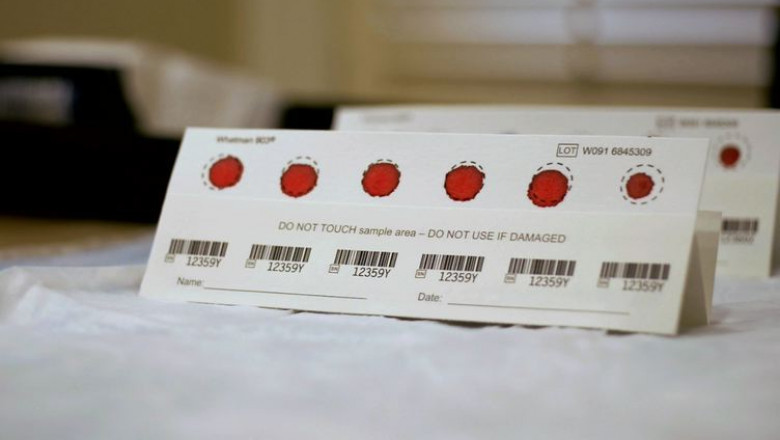views
The global Specimen Collection Cards Market is experiencing significant growth, driven by increasing demand for reliable, portable, and cost-effective methods of biological sample collection and storage. These cards, also known as dried blood spot (DBS) cards, offer a convenient method for collecting and preserving samples of blood, urine, saliva, and other biological materials for diagnostic and research purposes. Their use is expanding across clinical diagnostics, forensic science, pharmaceutical research, veterinary medicine, and environmental studies, making them essential tools in modern medical and scientific practices.
Market Dynamics
The growth of the specimen collection cards market is primarily propelled by the increasing need for minimally invasive sampling methods and improvements in diagnostic technologies. Traditional sample collection techniques often require specialized personnel, cold-chain logistics, and laboratory infrastructure. Specimen collection cards mitigate these challenges by allowing samples to be collected via a simple finger prick, dried on a chemically treated paper, and stored or transported without refrigeration.
Furthermore, the rising prevalence of infectious diseases such as HIV, hepatitis, and tuberculosis has amplified the use of DBS cards, especially in low-resource settings where access to sophisticated lab facilities is limited. Governments and health organizations across the globe are also endorsing these cards in public health surveillance and newborn screening programs.
Applications Across Diverse Sectors
Healthcare remains the largest segment for specimen collection cards. They are widely used in screening for metabolic disorders in newborns, prenatal diagnostics, therapeutic drug monitoring, and genetic testing. Their ease of use and the minimal volume of sample required make them particularly suitable for pediatric and geriatric populations.
In forensic science, DBS cards are employed for DNA collection and preservation, assisting in criminal investigations and paternity testing. The pharmaceutical sector uses these cards in clinical trials and pharmacokinetic studies, reducing the logistical burden and cost of sample collection. Moreover, veterinary applications are gaining traction, especially for wildlife monitoring and domestic animal diagnostics.
Technological Advancements
Ongoing innovation is enhancing the functionality of specimen collection cards. Advances include cards with integrated barcoding and RFID tagging for traceability, and cards embedded with reagents that stabilize biomolecules such as DNA, RNA, or proteins for extended periods. These innovations improve the accuracy of downstream analysis and ensure the integrity of stored specimens.
Companies are also developing multi-layered cards capable of collecting multiple sample types simultaneously. Such features allow researchers and clinicians to conduct multifaceted analyses from a single card, which is especially valuable in remote and emergency settings.
Regional Insights
North America holds the largest share of the global specimen collection cards market, attributed to advanced healthcare infrastructure, increased investment in research, and the presence of leading market players. Europe follows closely, driven by widespread implementation of neonatal screening programs and stringent regulatory frameworks.
However, the Asia-Pacific region is expected to witness the highest growth rate during the forecast period. Factors such as expanding healthcare access, growing awareness of early disease detection, and a rising focus on public health initiatives contribute to this growth. In countries like India and China, government-led programs for rural healthcare delivery are increasingly incorporating DBS cards as a standard collection tool.
Competitive Landscape
Key players in the specimen collection cards market include PerkinElmer, Ahlstrom-Munksjö, Eastern Business Forms Inc. (EBF), and Whatman (a part of Cytiva). These companies focus on product development, strategic partnerships, and geographical expansion to strengthen their market presence. Collaborations between diagnostic firms and card manufacturers are also fostering innovation in this space.
Mergers and acquisitions are further shaping the competitive dynamics, as companies aim to broaden their product portfolios and improve distribution networks. Moreover, the entry of new players offering cost-effective solutions tailored for emerging markets is intensifying competition.
Future Outlook
The future of the specimen collection cards market appears robust, with growing application potential in telemedicine, personalized medicine, and home diagnostics. As digital health technologies evolve, integration with smartphone-based analysis and cloud-based data storage may become a reality, enabling real-time monitoring and diagnosis from remote locations.
In conclusion, the specimen collection cards market is poised for continued expansion, fueled by technological innovation, global health challenges, and a growing emphasis on preventive care. With ongoing efforts to enhance card functionality and accessibility, these tools will play an increasingly vital role in shaping the future of diagnostics and healthcare delivery worldwide.






















Comments
0 comment